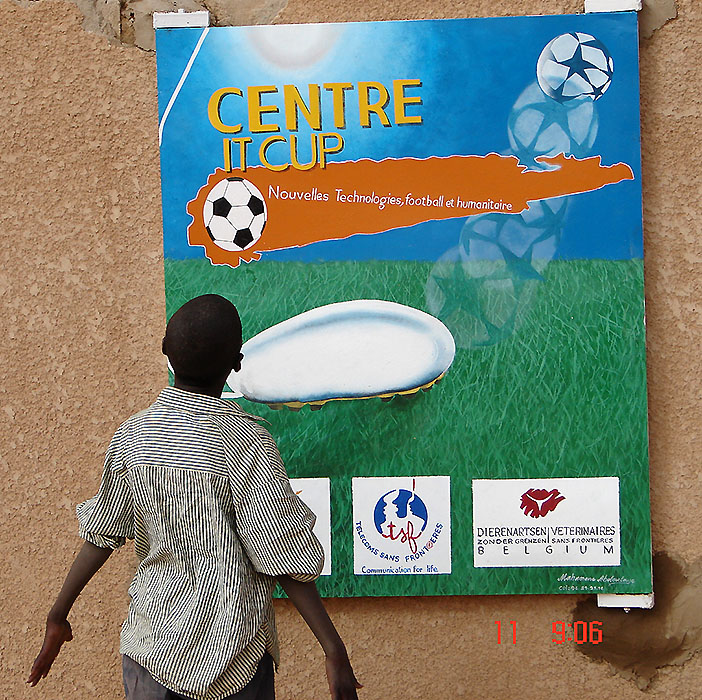Dakoro Community Centre
Context: Digital divide
Start date: 12/03/2007
End date: 31/12/2014
Areas of intervention: Dakoro
Activities: Community Centre
Attendance of the centre 50% of NGOs and 50% of individuals
185 users per month on average
40 people trained per month on average
42 organizations per month on average
Context
During the summer of 2005, Niger was one of the countries hardest affected by the food crisis that hit the Sahel countries: victim of an unusual dry season, the country also faced a locust invasion.
At this time, TSF made available a computer and satellite telecoms centre for the humanitarian community in Dakoro. In order to sustain the action initiated and to help reduce the risk of a new crisis, TSF set up a telecom centre for organisations working alongside vulnerable populations in the region. Before the opening of the centre, sending an e-mail meant a trip of nearly six hours to Maradi, the nearest connection.
Implementation
Involved in Niger since the summer of 2005 during the serious food crisis that affected more than 3.6 million people, TSF conducted various programs in emergency response (telecoms centre and humanitarian calling operations) and in protection and assistance. TSF aimed to sustain its action and help the long-term development of the community of Dakoro by reducing the digital divide. The command of ICT tools is an essential factor for the sustainable development of enclave communities.
In 2006, the IT Cup, an association that organizes a charity football tournament for companies in the new technologies sector, contacted Télécoms Sans Frontières. Thanks to the funds raised during the 2006 tournament, a community telecom centre was inaugurated in Dakoro on 12th March 2007 at the premises of Vétérinaires Sans Frontières Belgium.
“The support of TSF and the telecoms centre made available was very important during the food crisis that affected the Dakoro region in 2005. The IT CUP Centre will allow us throughout the year to communicate in real time as well as to save the time and cost of the trip to Maradi, to have access to a shared database for NGOs and to train our staff on computer tools".
Stéphane Pil, Head of mission in Dakoro for VSF Belgium - PROXEL project.
Community centre
The IT CUP Centre helps to open up the Dakoro region by creating an IT resource centre and reduces the risk of humanitarian crisis by transmitting and receiving crucial information for the community in real time.
In January 2010, the centre's Wi-Fi signal was expanded to share the connection with more offices and users.
At the disposal of 30 organizations - 90% of the agencies on the spot - and 170 members (local authorities, local associations of pastoralists and farmers, NGOs, United Nations), the centre supports organizations working with the most vulnerable populations in the region.
"The centre facilitates communication with many of my partners; now I can follow the news on medicine, have access to studies. What a satisfaction!"
Dr. Emmanuelle Ting, paediatrician representative of the NGO Médecins Sans Frontières Belgium at the Dakoro Hospital.
Computer and Internet training course
In order to ensure the professional future of the Dakoro students, it is essential to train them in the computer tool and the Internet. The TSF trainings include courses of writing reports of activity, search for information on Internet, and communication by email. The trainings are adapted to the needs of the various beneficiaries (NGO members, active professionals, students, jobseekers) by addressing several sectors of activity:
- Support for livestock and agriculture;
- Fight against exclusion;
- Fight against poverty ;
- Child protection ;
- Education and literacy;
- Information;
- Administration and local authorities.
These trainings significantly help in job search or to pursue studies, since professional opportunities are very limited in Dakoro, and most young people have no choice but to migrate to cities. The community centre has helped to:
- Train local people in the use of computers and the Internet;
- Strengthen existing development projects and improve the exchange of information between associations;
- Build local capacity;
- Improve the communication network with the outside world;
- Act positively on the local economy and improve living conditions;
- Raise awareness and respond in the event of a future crisis.
"The community centre provides special encouragement to all Dakoro youth and development NGOs and allows us to be in constant contact with the outside world. Internet allows me to send and receive documents quickly. The centre also helps us to improve our computer skills. Thanks to TSF centre, Dakoro is no longer isolated".
Illah Bassa, former director of the Dakoro Primary School and head of the Nomad-Call (NGO for Local Initiatives Development).
Project continuity
The priority for TSF is to ensure the sustainability of the project through proper transmission of the management of the centre and through strengthening capacity of local stakeholders. Local staff were recruited and trained in the initial phase of the project. Then, they can provide computer and Internet training to the beneficiaries and a local coordinator is in charge of managing the centre.
After two years of presence, the management of the centre was transferred to local partners. TSF, however, continues to follow the centre, accompanying their management and providing essential technical support to field staff.



















